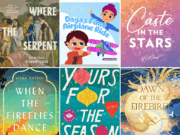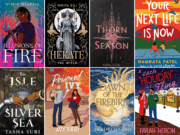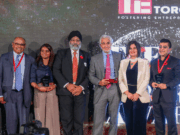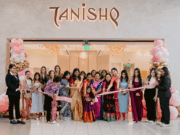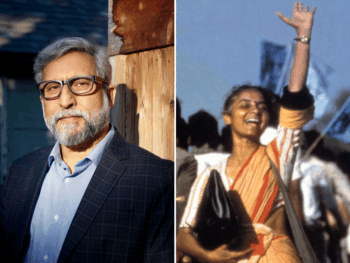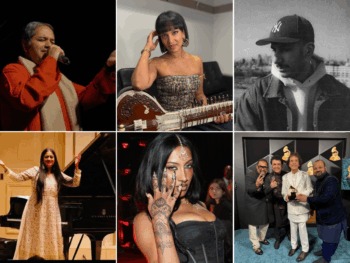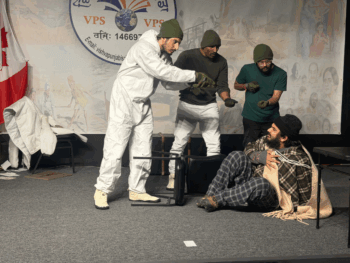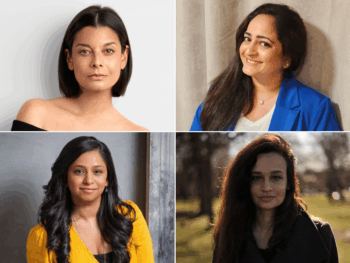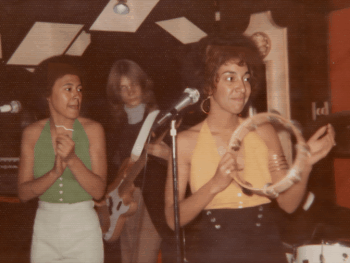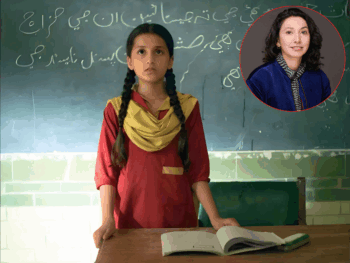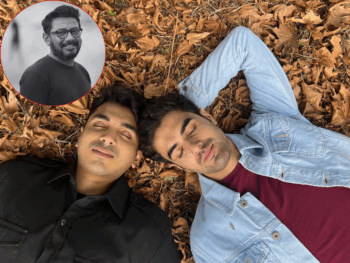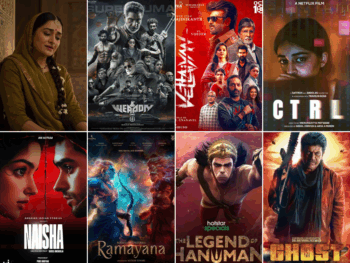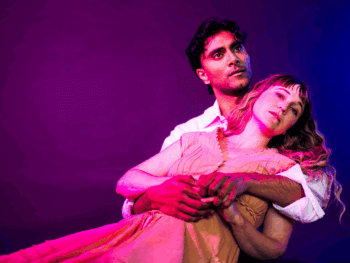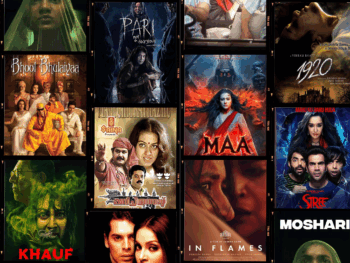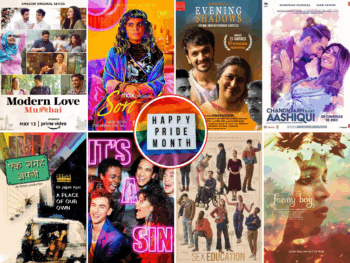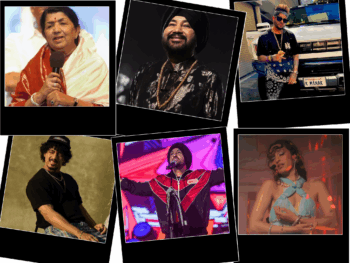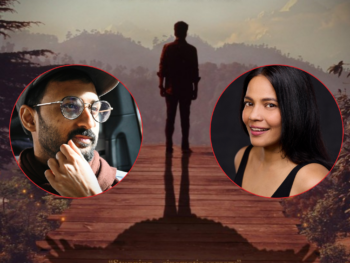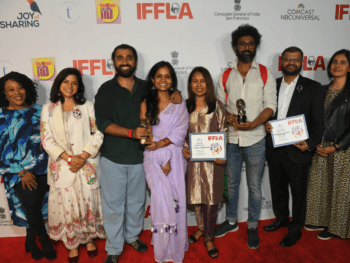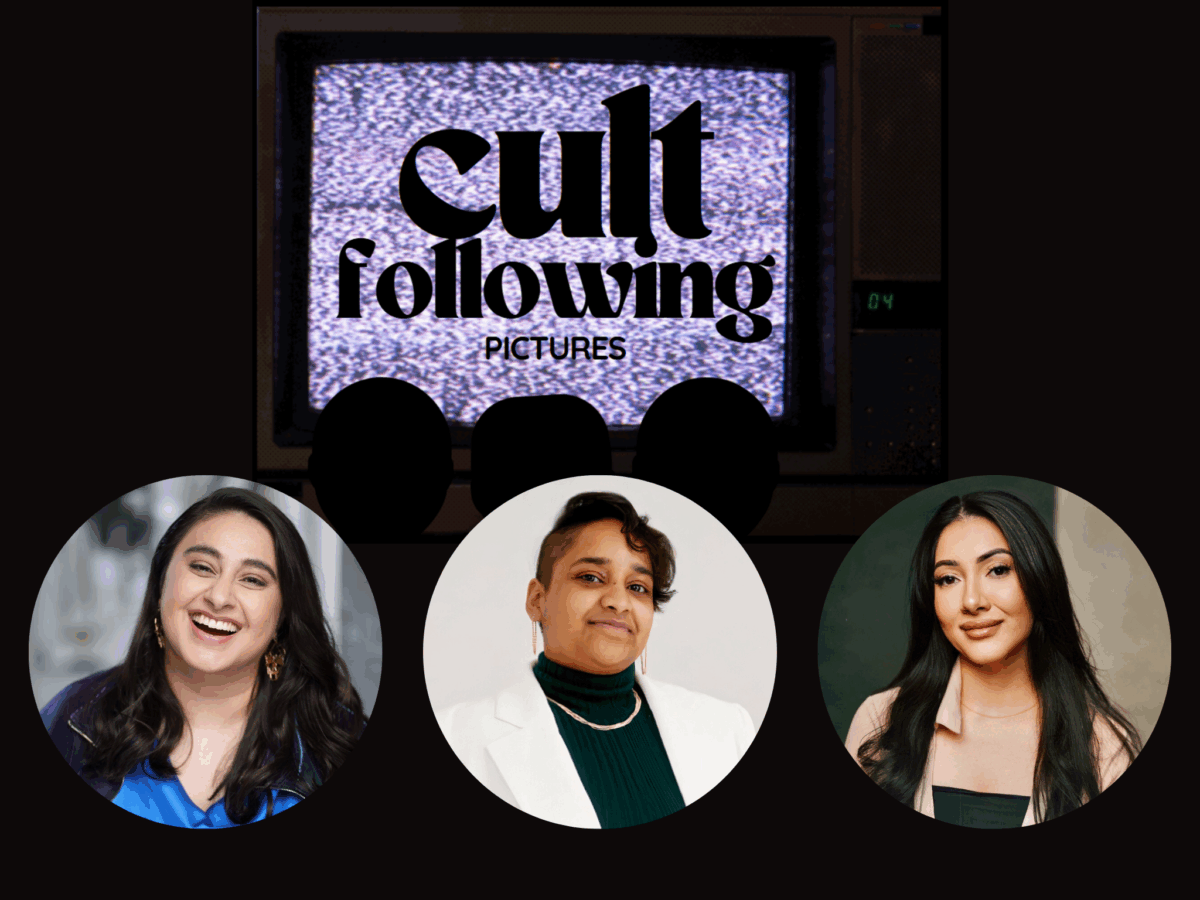
How Canadian Studio ‘Cult Following Pictures’ Is Changing Queer, Genre, & South Asian Storytelling
Entertainment Jun 30, 2025
After receiving the 2025 Rockie Awards Emerging Talent Prize at the Banff World Media Festival, Marushka Jessica Almeida, Nisha Khan, and Rabiya Mansoor proudly announced the launch of their new venture: Cult Following Pictures. Known for their daring and resonant storytelling, this award-winning trio has come together to create genre-bending narratives that defy stereotypes and reflect the world’s complexity. While their work is rooted in lived experience, it transcends identity labels to offer fresh, timely, and globally relevant stories that challenge established norms.
Marushka, Nisha, and Rabiya first joined forces as creators, writers, and executive producers of their award-winning short-form series Get Up, Aisha for CBC Gem. The series earned multiple 2024 TO Web Fest awards, nominations at the 2025 WGC Screenwriting Awards and Canadian Screen Awards, and ultimately secured them the 2025 Emerging Talent Prize at the Rockie Awards.
Together, they are a powerhouse trio reshaping the Canadian screen landscape with fearless, genre-defying storytelling. Through Cult Following Pictures, they aim to deliver bold narratives that blend genres, challenge conventions, and spark deeper conversations, all while staying rooted in authenticity. From crime comedies to psychological horror and whodunits, their work reflects the complexity of the world far beyond identity labels.
I had the opportunity to sit down with these trailblazing creatives to discuss their vision, upcoming projects, and how they’re building the kind of stories worth obsessing over.
Our Exclusive Chat With Marushka Almeida, Nisha Khan & Rabiya Mansoor:
Mehak Kapoor: Let’s start with the big congratulations on the Rockie Awards Emerging Talent Prize!
Marushka Almeida, Nisha Khan, and Rabiya Mansoor: Thank you so much, Mehak!
Mehak: We’re witnessing a powerful wave of South Asian filmmakers making their mark in the Canadian and North American industries, telling stories that are deeply personal yet widely relatable. As creators who are part of this momentum, how do you see your work contributing to and standing out in this growing landscape?
Rabiya: That’s a great question. I think for us, it’s about that moment when our obsessions align. We all have overlapping tastes, but we each bring our specific shows or films that we obsess over. So when the three of us come together and can’t stop thinking about a particular idea, when it keeps resurfacing in conversation, we know we’ve hit the core of what Cult Following Pictures stands for. That convergence is powerful. There are plenty of good ideas, but then there are the ones that keep us up at night, the ones that make us figure out how to break the story, secure funding, and bring it to life no matter what. Those are the stories worth obsessing over.
Nisha: Yeah, I agree. I think even the genre-bending aspect of it is about being able to play outside the box. As you go through this industry and hear a lot of ‘no’s while pitching, you start asking yourself, Can I take a risk? It often feels like risk isn’t encouraged. But those wild ideas you have, the ones where you think, this would be a great story, but it doesn’t fit into any box, where do they go? That’s something we all connected on. We love the idea of starting with a familiar genre that people know and love, and then twisting it in a way they may haven’t seen before. And that excites us.
Marushka: Yeah, I think I echo what both Rabiya and Nisha said. I think in addition to the content, another thing that we, the three of us, are like really keen on is also merging commercial success with niche-like content. I think that sometimes when you’re trying to sell things in the marketplace, you’re always thinking of what the audience will watch, but not really what the audience will come to watch if you show them that it exists. And I think that’s something that we are all like. Interested in finding our niche, like you know, building our cult by combining commercial success with great stories.
Mehak: That’s lovely to know! So, why Cult Following Pictures, and why now?
Rabiya: Well, for us, after working on Get Up, Aisha, we had already started developing our second project together, Bad Accountant. Through both of those experiences, we realised we worked well as a team. Even when we were working on individual projects, we always wanted to involve the other two in some way, shape, or form. So launching a production company together just felt like a natural fit and the next step in our creative partnership.
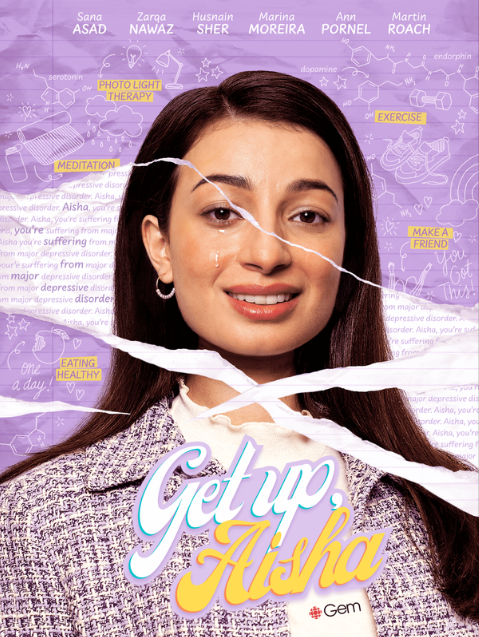
It’s funny, we spent so much time brainstorming the name. We kept asking, What reflects the kind of stories we want to tell? What speaks to who we are? At one point, I got stuck on names with ‘trio’ in them because, well, there are three of us! But when we landed on Cult Following, it just clicked. It perfectly described the kind of bold, boundary-pushing stories we want to champion. It also felt like the right moment, an evolution of our working relationship and a commitment to telling stories that often get overlooked in the Canadian media landscape. We want to offer something different from what’s already out there.
Nisha: I mean, I echo what Rabiya said. I think it’s a similar sentiment, since we’ve been working together on different projects and naturally mesh well, it just made sense. As we all know, this industry can be tough when it comes to collaboration. People have different tastes, and sometimes you don’t always see eye to eye. And that happens with us too; it’s not like we agree on everything.
But the collaboration itself has been so rewarding. We realised, ‘Hey, this process works, why aren’t we just doing more together?’ So from there, it felt natural to bring everything under one umbrella. We were already organically teaming up on more projects, so formalising it into a company just felt like the right move.
Marushka: Yeah, I agree with what both Rabiya and Nisha said. I think the question of why now is something we bonded over. Our industry is facing a tough time right now. In general, things are contracting, and it’s harder for people to find work or new opportunities. But through that contraction, I believe really specific, organic, beautiful stories can emerge.
We’ve always prided ourselves on being underdogs, on finding those beautiful moments even in the middle of chaos. That’s why it feels right to launch Cult Following Pictures now, during one of the hardest times. Because it’s exactly in moments like these that niche stories can find their audience. And really, what better time to do it than when everything’s on fire?
Mehak: I agree, I agree. So, as we’re seeing a powerful wave of South Asian filmmakers making their mark in the Canadian and North American industry, telling stories that are deeply personal, yet widely relatable. And as creators like you all, who are part of this momentum, how do you see your work contributing to and standing out in the growing landscape?
We can go ahead with Nisha first, and then we’ll go with Marushka and Rabiya.
Nisha: Yeah, I think the aspect of coming in as South Asian creators is something we talk about a lot among ourselves. We want to tell stories that reflect our backgrounds, but at the same time, we don’t want to be limited by them. Funny enough, that ends up helping our community because by broadening people’s perspectives on what we can do and how we can look, we help open doors. Even when we talk about leading roles, it’s not about a character being South Asian, it’s about them being the right fit because they’re talented and can own that role.
That’s always at the forefront of our minds when we’re creating or developing something. These things do matter. With Get Up, Aisha, seeing the impact it had, how people saw themselves reflected in characters they hadn’t seen before, made it so clear that our presence matters. The more thought and care we put into these choices, the better it will be, not just for us, but for the industry as a whole.
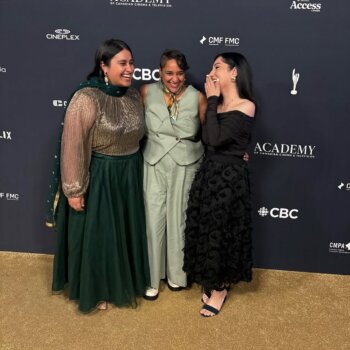
Marushka: Yeah, I agree with Nisha. I feel like, as South Asian filmmakers, we sometimes get boxed into this trap of representation. And I think we all agree, representation doesn’t automatically equal story. Authentic stories come from lived experience. Even the term South Asian covers so many different identities. Like, I’m Goan, and I grew up in the Middle East. There are so many nuanced, complicated characteristics that are unique to me. I’m not trying to speak for an entire community, I’m trying to speak to my own lived experience and the people around me.
That’s exactly what we’re aiming for: to be as specific as possible in the stories we tell so they can resonate universally. Whether it’s culture, character, or narrative, we want to stay specific. I think as South Asian filmmakers, our space is in telling our stories, and, in doing so, creating room for the creators who come after us to tell theirs, without feeling boxed into stereotypes.
Rabiya: And I agree with everything Nisha and Marushka have said. Just to add to that, in terms of this growing wave of South Asian creatives and content, it’s amazing to see, because it’s so unprecedented compared to what we’ve seen in media until now. But at the same time, we still have a long way to go.
So often, when we pitch a project or approach a broadcaster, we hear, ‘Oh, we already have a South Asian show.’ And even if what we’re pitching is a completely different premise, it doesn’t seem to matter; they feel they’ve already checked that box or reached that target audience. So we get sidelined because of that. We are making great inroads, but there’s still so much more work to do, and so many more steps to take.
Mehak: That’s great to hear your insights!
So, let’s talk horror. No One Leaves sounds terrifying, of course, in the best way. Why did you choose rural Ontario as the setting? Why is found footage the format? And how do you use the genre to smuggle in those deeper social truths you mentioned in your press release?
Rabiya: I think what we love about playing in genre, including horror, is that there are always parallels baked in when you explore something through that lens. Horror is especially exciting for us because it lets us examine social constructs and issues in ways that feel fresh and impactful.
With No One Leaves, we’re looking at family dynamics. Do parents truly know their children? How much do the children want to save or contribute to improving those dynamics? What happens when parents and children are at odds? Sure, we could have told this as a straight drama, there’s a version of that story, but horror and genre let us take things to the extreme. We can ask, what does it look like when those tensions are pushed as far as they can go? That’s a fun sandbox for us to play in, and that’s what excites us about this project and working in horror in general.
Nisha: I think one of my favourite horror movies that I watched recently is The Strangers, we were all so terrified by it! And I think what’s great is how something so simple, like the concept of a family stuck in a house or a cabin, might seem familiar at first. You might think, ‘Okay, we’ve seen this before, maybe it’s nothing new.’ But then it’s like, no, we’re going to flip it on its head. We’re going to bring in these really strange dynamics that not only play out within the family, but also explore what happens when they’re faced with a moral dilemma.
What’s fun is that it’s not just the family dealing with that dilemma; we’re placing it on the audience too, making them ask, ‘What would I do in this situation?’ That’s exciting for us to explore.
Marushka: Yeah, I agree. And I think the found footage element works because, again, we’re trying to find that balance between a commercially viable format and organic, meaningful stories. Found footage does well; it’s a beloved format in the horror market, and it’s great when it comes to selling to distributors. We wanted to test out something as big and intricate as this family story, but place it within a genre format that audiences already connect with.
Mehak: Yes, my favourite cinema genre is horror!
I have a question for Rabia now. First, congratulations on your ACTRA Award for Bad Accountant! The film tackles queerness, crime, comedy, and identity all at once. Can you share a bit about how the project originated and how it’s been received, especially with June being Pride Month?
And for the team, how do you approach telling LGBTQIA+ stories without falling into the trap of ticking a representation checklist?
Rabiya: Thank you so much, Mehak
Yeah, it was so wonderful to receive this award from ACTRA for our short film. What I love about Bad Accountant is that yes, it centers queerness, the central character is queer, but at its heart, it’s really about the crime, comedy, mafia world. And that’s exactly what Cult Following is about for us. It’s not just about representation; it’s about moving beyond that to tell really interesting stories with queer characters at the center.
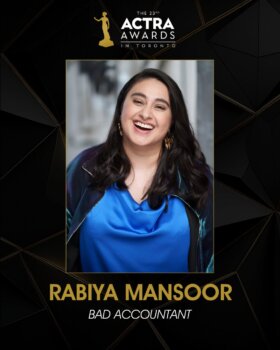
That’s what I love so much about Bad Accountant and what makes it so fun. It’s been incredible to see how well it’s been received, not just by the queer community, but also the South Asian community, and honestly beyond that too. People just find it funny! That’s the great thing about working in genre and comedy: even folks who might not have been open to these kinds of stories are drawn in because it’s genuinely funny. It lets them see these characters in a new light. So yeah, it’s been a special time for the project, and I’m so honoured that it’s being recognised.
Mehak: Superb, congratulations once again, Rabiya!
So, let’s talk about Who Killed Aunt Dolly? Feels like a future cult classic already.
What can you tell us about this project without giving too much away? Are you learning a full whodunit, or should we expect a mix of chaos, comedy, and curveballs?
Marushka: This one’s going to be fun! It’s a mix of a whodunit and a bit of screwball comedy because, let’s be honest, you can’t have drama at a brown wedding without absolute mayhem. We’re trying to combine the already chaotic nature of brown weddings and then add a little murder into the mix to see what happens.
Right now, as we’re developing it, we want it to feel like one of those upper-class brown weddings, but also explore what’s beneath the surface, how these weddings can sometimes be exploitative, or become breeding grounds for wild family feuds, revenge fantasies, and more. And all of that comes together in Who Killed Aunt Dolly?
Mehak: Yeah, sounds wild! When you say ‘modern,’ it does sound crazy. What do you both think about that, Nisha and Rabiya?
Nisha: I love that Marushka brought up the idea of revenge fantasies because that’s so true. Even the title grabs you, I feel like every brown person knows an ‘Aunt Dolly,’ right? Someone who goes by that name, but it’s not their real one. The story plays on so many experiences we all recognise but rarely see represented. That’s the fun part for us. Even though the project is still in early development, just talking about the wild family dynamics has been such a blast. We see all these layers, classism, the subtle ways people ‘uppercut’ each other, but we also want to go deeper, to tell a story that hasn’t been told before.
Rabiya: Yeah, it’s going to be a super fun, off-the-wall comedy, which is exciting. Our goal is to structure it as a co-production, which would be a first for us, and that’s something we’re looking forward to. We hope to shoot some parts abroad and bring more of the global South Asian diaspora into the story, which would make it even more vibrant and exciting.
Mehak: Amazing, amazing! Finally, can you give us a sneak peek into Cult Following Pictures’ future? The journey ahead is bright and cult-worthy, as we’ve already discussed. Are there more short films, features, or even international collaborations in the pipeline? And what’s the long-term vision for the company?
Rabiya: All right, I’ll start us off. Marushka is working on an exciting short film in Italy later this year, which we’re looking forward to. For the long term, our vision goes beyond telling our own stories; we want to partner with incredible voices in the industry and support them as producers, whether it’s on short films or features. We’re truly excited about building lasting collaborations and growing together.
Mehak: That’s amazing, congratulations, Marushka! Wishing you all the best with the project. Could you share a bit about it? And Nisha, what’s your vision for the company’s long-term future?
Marushka: Thank you!
I think our vision is pretty simple and it’s always been the same: to do cool things with cool people. As we grow in experience and skill through each project, we aim to keep levelling up the scale and quality of our work. This also ties into what Rabiya mentioned about collaborating with talented people we admire and building long-lasting creative relationships. In this industry, finding your people and making meaningful connections is challenging, so we don’t take it lightly when we start working with new collaborators. We hope these connections last for years and continue to grow as we keep honing our craft.
Nisha: I echo what both Rabiya and Marushka have said. We recently had a conversation among ourselves about the importance of always following the fun. The stories that truly excite us are the ones we want to keep chasing and bringing to life because if we’re not excited, no one else will be. We must care deeply about the projects we take on.
Also, like Marushka mentioned about collaboration, when we first worked together, we realised how important it is to create a supportive environment. We know what it’s like to work with people who don’t understand your vision or who aren’t kind. So, we want to make sure that anyone who works with us walks away feeling inspired, supported, and energised. Creating that kind of space for others is a big part of our mission, especially because that’s what we wished for when we were starting in our producing careers.
Mehak: That’s such a beautiful mindset, and I wish you all the very best. Before we wrap up, I have some fun and frolic rapid-fire question for you:
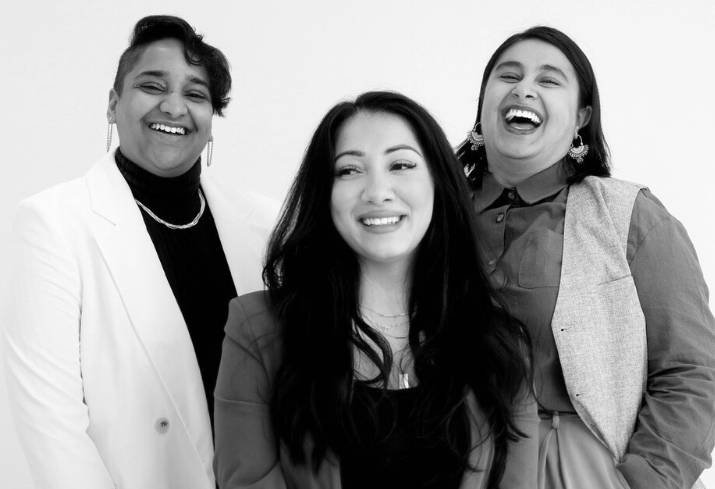
Mehak: You are aware of…
Rabiya: Uh, the social inequalities in the world.
(All laughing together)
Mehak: Alright, it’s going to be an amazing game! What do you think about that, Nisha?
Nisha: Oh my god, how do I even follow that? I’m aware of how sweaty I am because it’s so hot in here, I honestly can’t top that! I can’t lie and say I was thinking about what’s happening, and some- But I wish I was.
Marushka: I’m aware that life is short. That’s all, like, yeah, that’s it.
Mehak: You are fearful of…
Rabiya: Spiders
Nisha: I am fearful of lying!
Marushka: Hypocrites
Mehak: You are angered by…
Rabiya: (Laughing) I wasn’t going to say this, but while I appreciate the social qualities of the world, I’m honestly frustrated by how quickly bagels go stale. I wish they lasted longer!
Mehak: The dog?
Rabiya: No, the bagels, I just went to Costco today, and the bagels are looking good in a few days.
Mehak: (Laughing) Ah, I thought you meant the dog breed, Beagle! I was like, they don’t have such short lifespans, they usually live 14 to 15 years. But alas!
Nisha: Is it just me, or does anyone else get annoyed when you ask something in an email and the reply completely ignores it, instead focusing on something else? Ugh, it drives me crazy!
People with bad email etiquette, yeah!
Mehak: Yes, I agree.
Marushka: I get so annoyed by people who can’t just walk on the right side of the road. Like, just stay in your lane, and we can all move smoothly back and forth. You stay there, I stay here, we walk, you walk fast, and we all get to our destinations. Peace restored in the world!
Mehak: Yeah, you are in love with…
Rabiya: Ooh, I’m in love with parks. I like just the green spaces, like in Toronto. It’s nice to just be able to see greenery in my life now and then.
Mehak: Nature, yeah. Yeah.
Nisha: I’m in love with her, honestly, because I’m going to see her tomorrow, and I haven’t seen her in such a long time. My five-year-old niece, I am absolutely in love with her, and I just look at videos of her all day, like a weirdo, but yeah, I love her.
Marushka: I’m in love with Love Island USA. It’s the show Love Island USA. It is so fun and it is so stupid and it’s giving me joy. And the fact that there are 30 episodes more to go. I love that.
Mehak: You are best at…
Rabiya: Ooh, I feel like cracking jokes occasionally, you know?
I got that in the bag!
Mehak: Yes, we just saw that, haha!
Nisha: Also, I was going to say, Rabiya is like a jack of all trades, can do everything! So I just find it funny that this is one of the basics, because I feel like I’m the best at it. But honestly, I think I make a really good banana pudding. I get a lot of compliments on it, and I genuinely believe it’s the best banana pudding!
Marushka: Um, excuse me, I think I’m the best at gaslighting because I can make people second-guess themselves and regret things!
Mehak: Oh my God!
(All laughing)
Marushka: I think I’m writing to people like a gaslighter for their good.
Mehak: You are shy of…
Rabiya: Talking to people, to be honest, I think my parents made me talk to strangers when I was younger to get me out of it, but still, I get a little shy.
Nisha: I am shy of I would say maybe wearing a bold outfit. Sometimes I want to wear a bold outfit, but then I change because I think I’m drawing too much attention, so maybe that.
Mehak: Yeah, likewise.
Marushka: I’m shy of talking to babies and children. I find it difficult to communicate with kids because it’s just so awkward. I’m like, what am I supposed to say to you? What are you supposed to say to me? What is acceptable in this moment? You’re hitting me, and I don’t know what else to do. I find I struggle. I found it awkward to talk to kids.
Mehak: You are always ready for…
Rabiya: I’m always ready for a fight, though I don’t know if that’s true. I’ve never fought anyone in my life… maybe just mentally. I’ve mentally fought a lot of people! Honestly, I feel like I’m always ready for a nap.
(All laughing)
That’s the real truth, I’m ready to take a nap whenever, wherever.
Mehak: That’s a good one!
Nisha: I’m always ready for a chai break.
Mehak: Yeah. Yeah, agree. I can have that.
Marushka: Um, I’m always ready to go for a midnight movie. I think I love watching movies at night. So yeah, doing that.
Mehak: Excitement is…
Rabiya: For me, excitement is getting a really good hug. I feel like that just, you know, that makes me very excited for my day.
Mehak: That’s sweet!
Nisha: Oh my gosh, for me, I think excitement is when I come up with a really what I think it’s a really good idea. It doesn’t go anywhere. But I feel excited that it’s the start of maybe something great. Yeah, maybe like a new idea that I feel excited about.
Marushka: For me, excitement is when I use the Instant Pot and it doesn’t burn! You know how it is, if you don’t deglaze it properly, it burns. I only recently started cooking because I’m honestly not great at it, so anytime it doesn’t turn into a total train wreck, I’m like, “I did it!” That’s what gets me excited.
Mehak: That’s deep, hey, that’s deep. I was thinking, okay, okay. I’ve not used it before.
Confusion is…
Rabiya: Um, for me, confusion is not understanding what people mean when they talk to me and like all the subtext and trying to figure out what exactly they’re saying. I get, I get confused.
Nisha: For me, confusion is, I would say, when you’re out with someone to eat, unless they have a dietary restriction, when they don’t want a sweet treat at the end, that’s confusion. That is confusing. Because I’m like, what do you mean we’re eating and then we’re going to leave without having a sweet? That is confusing to me.
Mehak: Yes, I agree with this!
Marushka: Um, I guess because this happened to me recently, for me, confusion is when people say they don’t like music, or that they don’t like any music. And I’m just like, how am I supposed to communicate with you now? What are we supposed to talk about? I find that so confusing. Like, even if you have what some might call bad taste, it’s still taste! But no music at all? What are you doing? That confuses me.
Mehak: Prejudice is…
Rabiya: For me, prejudice is when people aren’t willing to take the time to understand experiences outside of their existence. I feel like that’s the root of all prejudice for me.
Nisha: Yeah, I mean, I think I would say the same in a sense of, I think when people use the word ignorance is bliss, and try to pass it off as, as they just don’t know. But I think there are layers to that. So, prejudice is ignorance.
Marushka: I think what Rabiya and Nisha said is right. I don’t know why my brain went to like its pride because of Pride and Prejudice, and I’m nothing else. So yeah, it’s just go with what they said. I’m blanking on that one.
Mehak: That’s okay!
Peace is…
Rabiya: For me, peace is like when I get up in the morning and I don’t have meetings until the afternoon, so then I can kind of do like whatever I want in the morning, like that’s just that’s real serenity.
Mehak: That’s so me!
Nisha: Peace to me is just being able to lie in the grass on a nice, cool day with no worries and nowhere else to be, just staying there all day without a care in the world.
Marushka: Peace to me is a long walk. I love walks, I think at any time of the day, especially at night, but I think peace to me is like long walks at night.
Mehak: Satisfaction is…
Rabiya: For me, satisfaction is living life within my values.
Mehak: Yes, that’s deep!
Nisha: I know that’s so deep.
For me, satisfaction is, I think, if I go out for an event and then I come home and my room is still decently cleaned, and then I get to get into my bed and it’s nice and like my room feels clean. I feel like that’s kind of satisfying, very specific, I don’t know why I thought of it.
Mehak: Yes, I can imagine that!
Marushka: I think for me, satisfaction is that feeling you get after you’ve eaten, not when you overeat, but when you’ve had just enough. You feel full, satisfied, but not bloated. Hitting that exact sweet spot is so rare for me, so when it happens, that’s true satisfaction.
Mehak: Loyalty is…
Rabiya: For me, loyalty is giving me grace when I make a mistake and allowing me to correct it.
Mehak: That’s sweet.
Nisha:For me, loyalty is if I hate someone, you hate them too, and if I catch you with them. You’re disloyal.
Mehak: That’s so girly girl!
Nisha: And I think, I think I think Rabiya will fight them then. And start by.
Marushka: I think loyalty is easy to lose, but hard to obtain.
Mehak: Friendship is…
Rabiya: For me, friendship is when I can vent to you about anything, and without even knowing the full story or what the beef is about, you’re immediately on my side, just fully on board with my venting session.
Nisha: I think friendship is knowing someone where so much time has passed and when you come back together, it hasn’t changed because you knew the essence of that person, and so even though all this time has passed you’re still you still maintain a nice relationship, a good relationship.
Marushka: For me, friendship is, I think, the ability to communicate without words. Like sometimes like, you know, you and your friends, you just share a look and then you all know exactly what you’re talking about. And it’s that mind-reading-like ability that I think is true friendship.
Mehak: That’s beautiful. Okay, last but not least, this is a question that always makes people pause because it takes a bit of deep thinking.
I don’t know about you all, however, love is…
Rabiya: For me, love is about wanting to understand the other person’s inner world, and having them equally want to understand mine.
Mehak: Yeah, that’s…
Nisha: Oh my god, my mind immediately went to Pyaar Kya Hai from Kuch Kuch Hota Hai… I think love has so many layers, but one important element is sacrifice, sometimes putting aside your feelings or perspective to truly understand another person. And I believe that’s a crucial part of love.
Marushka: I think love is like a balance of safety and freedom all at once. It’s about having the space to explore who you are, while also feeling held and supported. You can be quiet with someone and still feel deeply connected. That’s what love means to me.
Mehak: That’s amazing, truly inspiring! Thank you so much, Marushka, Nisha, and Rabiya, for such an insightful and heartfelt conversation. Your passion, creativity, and drive are truly infectious, and we can’t wait to see what Cult Following Pictures has in store next.
Wishing you all continued success, we’ll be watching closely and hope to speak with you again soon. All the best, and have a wonderful, beautiful summer! Thank you again.
(Smiling together)
Marushka Jessica Almeida, Nisha Khan, and Marushka Jessica Almeida:
Thank you so much for having us! It was fun, this was great!
Cult Following Pictures
A little about them:

Marushka Jessica Almeida: Born and raised in the Middle East, Marushka Jessica Almeida (they/them) is a Goan-Indian writer and producer with a colourful career path, including stints as an accountant and music business manager. Recently, they were the story editor for SyFy/Peacock’s Revival and served as Executive Producer/Creator of the award-winning digital series Get Up, Aisha (CBC Gem) and POV: me (Shaftesbury Kids). Their credits include Made For TV with Boman Martinez Reid (Crave/Roku), Saint Pierre (CBC), Homeschooled (CBC), Streams Flow From a River (Superchannel/Apple TV, Amazon Prime), and Revenge of the Black Best Friend (CBC). A 2025 WGC Screenwriting Award nominee, Marushka is also an alumnus of CFC’s 2024 Comedy Story Room and Blood in the Snow Horror Lab. When not wrestling with existential dread, they’re lobbying for public nap spaces.

Nisha Khan: Nisha Khan is an award-winning Canadian-Pakistani writer and producer redefining South Asian and Muslim representation in media. She created, wrote, and produced the Canadian Screen Award–nominated digital series Get Up, Aisha, now streaming on CBC Gem. Nisha has written for CBC, Netflix Canada, Headspinner, and Marble Media, and is developing several projects, including her first short film supported by the Canada Council for the Arts. She’s received honours like the Warner Bros Discovery Access x Canadian Academy Writers Program, MPAC Hollywood’s Children’s Animation Fellowship, and Magee TV Diversity Mentorship. Recently, she participated in the Canada-Asia Pacific co-production accelerator (CAPCA) with top Korean drama producer SLL. When not working, she’s probably building houses in The Sims.

Rabiya Mansoor: Rabiya Mansoor (she/they) is a queer, disabled screenwriter, actor, producer, and recovering lawyer. Recognised as a Producer to Watch at Series Mania 2024 and Woman to Watch by The Hollywood Reporter, Rabiya won the inaugural Outstanding Performance – Non-Binary/Gender Non-Conforming at the 2025 ACTRA Awards. Their credits include Dino Ranch (Disney Jr./CBC Kids), Strawberry Shortcake: Berry in the Big City (Netflix), and the co-created dramedy Get Up, Aisha (CBC Gem), nominated for multiple Canadian Screen Awards. Currently, they’re producing a feature executive-produced by Paul Feig and writing a Canada Council–supported sci-fi film. Rabiya has trained at labs such as Respectability Entertainment Lab and RIFF Talent Lab, and volunteers with Breakthroughs Film Festival and Toronto Sketch Comedy Festival.
Featured Image: https://cultfollowingpics.com/
Mehak Kapoor | Entertainment Editor
Author
Mehak Kapoor (@makeba_93) is an entertainment and lifestyle journalist with over a decade of experience in anchoring and content creation for TV and digital platforms. Passionate about storytelling and factual reporting, she enjoys engaging with diverse audiences. Outside of work, she finds solace i...










